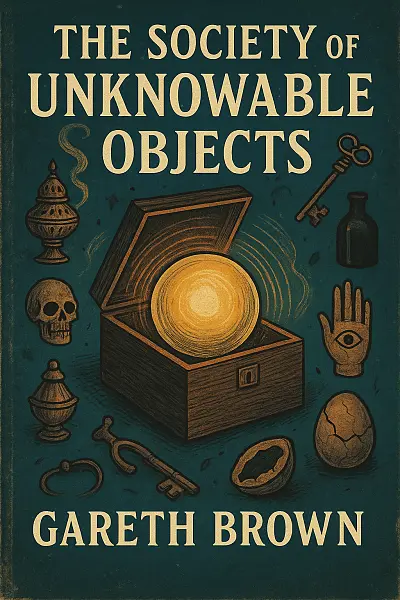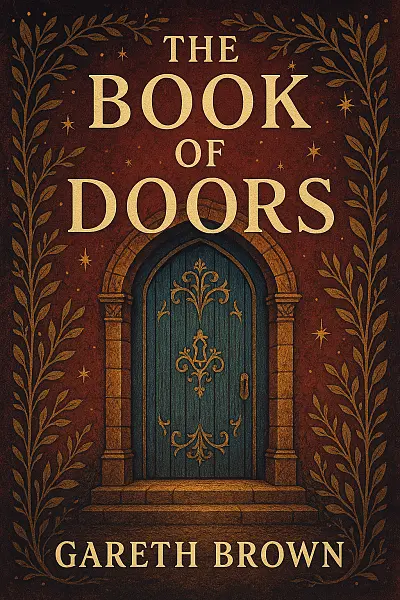
The Society of Unknowable Objects
by: Gareth Brown
Magda Sparks spends her days as an author in London and her nights as the newest member of the Society of Unknowable Objects—a secretive trio dedicated to guarding magical artifacts hidden just beneath ordinary life. Their world seems quiet, until rumors of a new, powerful artifact in Hong Kong land Magda in sudden, high-stakes danger.
Thrust into a deadly chase by a relentless professional killer, Magda races to outwit rivals and unravel the truth about the Society’s purpose. With each revelation, the risk escalates—not just to the magic, but to the very bonds of trust holding the Society together.
Brown’s tone is witty, atmospheric, and laced with suspense, balancing magical wonder and real-world tension. You can almost feel the secrets pulsing through the pages—and you’re left hungry to know if Magda will crack the mystery before everything falls apart.
"“In seeking what cannot be known, we discover what cannot be forgotten.”"
Let's Break This Down
The Author's Voice
Atmosphere
- Expect a mood that’s thick with intrigue—think velvet-draped shadows and labyrinthine city streets where every corner holds a quiet tension
- Brown crafts a sense of otherworldly mystery, threading an undercurrent of unease even in the most mundane moments
- The world feels a touch surreal, yet grounded in sensory details that make each setting pulse with low-key suspense
Prose Style
- The writing leans toward sharp, unfussy sentences—there’s a crispness to every line, with the author favoring clarity over flourish
- Dialogue snaps with understated wit and subtle irony, giving characters a sense of offbeat realism
- Descriptive passages blend the concrete with the peculiar, so readers always feel slightly on edge, never sure what’s ordinary or significant
Pacing
- The story has a deliberate, almost meditative rhythm—slow-burn in the best sense, pulling you deeper chapter by chapter
- Don’t expect whiplash action—events unfold methodically, with tension rising gradually like steam
- Brown knows when to linger and when to nudge the narrative forward, resulting in a reading experience that feels hypnotic rather than hurried
Characterization
- Characters are drawn with quirks and contradictions; no one feels like a stock figure, and even minor players get splashes of memorable detail
- The protagonist’s inner life is explored with nuance, giving you a direct line into their uncertainties and obsessions
- Relationships are handled with restraint—emotions simmer beneath the surface rather than erupting into melodrama
Thematic Undertones
- Major themes circle around the unknowable—identity, secrecy, and the search for meaning in chaos
- There’s a chilly beauty to the book’s explorations of ambiguity and ambiguity, leaving readers pondering long after the final page
- The narrative encourages curiosity and skepticism in equal measure, refusing easy answers
In short: If you love stories that hum with quiet strangeness, revel in ambiguities, and offer more questions than answers—this style will absolutely hook you.
Key Moments
- That wild scene in the secret archive—where reality bends and objects whisper their histories
- Narrative style flips genres on a dime: spy thriller one page, metafictional mystery the next
- Malcolm’s obsession creeping into paranoia—is he losing it, or is the world just that bizarre?
- Tiny footnotes reveal massive secrets—miss one, and good luck making sense of chapter eight!
- The impossible object in Chapter 14—an emotional gut-punch wrapped in scientific absurdity
- That eerie museum visit—deadpan humor mixed with existential horror, and it seriously works
- Big questions about memory, trust, and reality—all hidden beneath a layer of puzzle-box plotting

When secrets surface, reality unravels—mystery meets the surreal.
What Readers Are Saying
Right for You If
If you’re into books that blur the line between reality and mystery—think strange secret societies, cryptic books within books, and a dash of the surreal—then The Society of Unknowable Objects is totally your vibe. Honestly, if you loved stuff like The Shadow of the Wind, House of Leaves, or even the weirder corners of Neil Gaiman or Borges, you’re definitely the right audience. It’s perfect for readers who enjoy slow-burn intrigue over breakneck action and like to sit with their books, mulling over what everything means.
-
If you love:
- Literary mysteries with bizarre twists
- Secret societies and libraries with a mind of their own
- Atmospheric, slightly eerie vibes
- Books that leave you with more questions than answers
- Quirky, character-driven narratives
then you’re in for a treat!
But, just to be real: if you’re looking for a straightforward, tightly-plotted thriller, or you want answers handed to you on a silver platter, this one will probably frustrate you. It’s definitely more about the journey than a clear, tied-up ending. If you’re not into books that flirt with the supernatural or leave things up for interpretation, you might want to skip it.
So, in a nutshell: curious minds, lovers of puzzles and atmospheric weirdness—jump in. Action junkies or those who crave a crystal-clear plot—maybe look elsewhere.
What You're Getting Into
In a city where secrets are currency and reality seems to shift like smoke, a socially awkward librarian finds herself swept into the enigmatic Society of Unknowable Objects.
When a mysterious artifact lands in her lap, she’s drawn into a shadowy web of code names, riddles, and unseen dangers where nothing—and no one—can be trusted.
If you’re into twisty, whimsical adventures layered with oddball humor and eccentric characters, this book promises a clever, mind-bending ride through the surreal corners of curiosity and conspiracy.
Characters You'll Meet
-
Cormac Easton: The curious, persistent protagonist whose fascination with mysterious objects leads him deep into the heart of the Society and its secrets. His determined quest for understanding drives the story forward and exposes hidden truths.
-
Ellen: Cormac’s intelligent and skeptical wife, whose support and caution provide an emotional anchor for him as his obsession grows. She grapples with the tension between worry for Cormac and loyalty to him.
-
Fergus: The enigmatic leader of the Society, whose charisma and ambiguous motives keep members—including Cormac—alternately awed and wary. Fergus’s philosophy shapes the arc of the Society and much of the plot’s suspense.
-
March: A keen, sometimes secretive fellow Society member who helps guide Cormac through the initiation process. March plays a critical role in revealing the Society’s deeper mysteries and testing Cormac’s resolve.
-
Detective Matheson: The dogged investigator whose inquiries into the Society add an undercurrent of danger and urgency. Matheson’s pursuit threatens to unravel Cormac’s world and exposes the risks of uncovering forbidden knowledge.
More Like This
If The Society of Unknowable Objects left you with the deliciously off-kilter feeling of reality warping at the edges, you’ll probably find House of Leaves by Mark Z. Danielewski is a kindred spirit—both books twist narrative expectations and pull readers into a labyrinth of mystery and obsession, offering meta-textual puzzles that itch at the brain. Similarly, fans of Never Let Me Go by Kazuo Ishiguro will notice a shared undercurrent of uncertainty and quiet unease, where what remains unsaid often carries heavier weight than what’s revealed, fostering that intimate blend of psychological suspense and melancholy.
On the screen, the book’s shadowy vibe and ambiguous realities call to mind the enigmatic storytelling of Twin Peaks. That same blend of surreal moments and small, seemingly mundane details weaving together into a tapestry of the uncanny will absolutely resonate here—there’s an irresistible pull toward unraveling secrets that may never fully reveal themselves. It’s a cocktail of intrigue and cerebral tension that’ll remind you just how deliciously strange fiction can be.
Critic's Corner
What if magic were hidden in plain sight, its power tethered precariously to the most mundane of objects? Gareth Brown’s The Society of Unknowable Objects probes the unsettling question: Should some mysteries stay protected—even from those entrusted with them? This latest standalone from the author of The Book of Doors beckons us into a shadowy underworld of secret societies, unspoken legacies, and the irresistible allure of truths best left unexplored.
Brown’s craftsmanship is evident in his brisk, quietly confident prose—he expertly balances clarity with subtle lyricism, making even the most intricate magical machinations feel curiously believable. Scenes shift effortlessly from the storied backstreets of London to a breathless chase through Hong Kong, rendered through succinct, evocative description that prioritizes atmosphere over florid detail. Rather than relying on lengthy exposition, Brown trusts readers to glean the rules of his magical universe from sharp dialogue and implication. The pacing is deft, driven by short, propulsive chapters that keep tension simmering just below the surface. Each society member’s viewpoint is distinctly drawn, especially Magda, whose internal monologue crackles with humor, vulnerability, and a longing for meaning—she’s that rare protagonist who feels both larger-than-life and instantly relatable. There’s a cinematic quality in Brown’s action sequences, but he’s equally adept at small, intimate moments—a fluttering heartbeat during a secret meeting, a lingering glance at an object that might be far more than it appears. Brown’s restraint is his strength: never over-explaining, always beckoning us forward.
Beneath its magical trappings, this novel dares to ask whether knowledge itself can be corrosive—or redemptive. Themes of secrecy, legacy, and intergenerational trust ripple through the narrative. The hidden artifacts serve as clever metaphors for secrets and traumas handed down quietly through families and institutions: burdens no one truly understands, yet everyone must protect. Brown explores how truth, when hoarded or weaponized, can fracture even the tightest bonds, inviting readers to ponder the ethical dilemmas of stewardship and transparency in a world oversaturated with information. In an era of viral conspiracies and guarded technologies, The Society of Unknowable Objects feels uncannily relevant—what do we lose when the line between the magical and the mundane disappears, and isn’t there value in mystery for its own sake? Brown’s deft layering of action and existential paranoia gives the novel a creeping resonance that lingers long after the final page.
Within the rich tradition of secret society fantasy—from The Magicians to The Rook—Brown carves a distinctive niche, refusing bombast in favor of a more intimate, emotionally resonant approach. Fans of his debut will recognize the subversive wit and affection for battered protagonists in over their heads, yet this novel feels more mature, its stakes both grander and infinitely more personal. Brown delights in upending tropes: society members are neither all-knowing nor infallible, and the magic is never simply an escape.
Some stumbles emerge—supporting characters sometimes blur together, and a few twists feel more obligatory than revelatory. Yet these are minor in light of the book’s cumulative power. The Society of Unknowable Objects is a sly, heartfelt triumph—one that leaves us both satisfied and hungry for more secrets.
Community Thoughts
okay but why did i keep thinking about Professor Langley’s cryptic smile days after finishing? that guy is in my dreams now, just floating there, smug and mysterious. thanks for the insomnia, gareth brown
I CAN'T STOP THINKING ABOUT THE SOCIETY OF UNKNOWABLE OBJECTS. That scene when the lights flickered and everyone realized reality was up for grabs? I was up until 3 a.m. just staring at my ceiling. Truly unsettling.
Why did I stay up all night reading this? That scene where the box opened and reality blurred around Elspeth gave me chills. I kept checking my closet after. Gareth Brown, you owe me some sleep.
okay, but why did that bizarrely polite archivist keep popping up in my dreams? i swear i saw them in my kitchen at 3am. this book messed with my HEAD and my SLEEP. thanks, gareth brown... i think?
I CAN'T STOP THINKING ABOUT THAT SCENE where the curator just smiles and shuts the door, like he knows everything and nothing at once. This book scrambled my sense of reality and I loved every baffling minute.
Leave Your Review
Local Take
Why It Matters
Sure thing! For clarity, could you confirm which country or culture you’d like the analysis tailored to?
Food for Thought
Notable Achievement:
The Society of Unknowable Objects by Gareth Brown has captured the imagination of readers with its clever, genre-blending narrative—earning praise for its originality and for being a breakout debut. The book’s unique premise and inventive storytelling have steadily grown an enthusiastic fanbase, cementing its place as a standout in recent speculative fiction releases.
Like what you see? Share it with other readers







